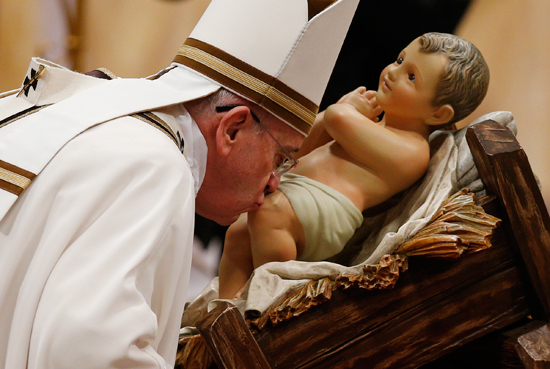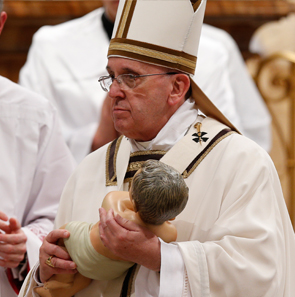“God is in love with our smallness,” Pope Francis said during Midnight Mass, just hours after speaking to Iraqi refugees at a camp in Irbil.
The Pope used his homily at St Peter’s in Rome to call Christians to a “tender” response to suffering in the world.
“How much the world needs tenderness today!” he said. “The Christian response cannot be different from Gods response to our smallness. Life must be met with goodness, with meekness.”
Christmas around the world
- Christians called to respond with “tenderness” to global suffering, Pope says
- Earlier yesterday evening he called refugees at a camp in Irbil and expressed closeness to them
- In Westminster Cardinal Vincent Nichols remembers year when extremists forced Christians from their homes
- In Bethlehem Patriarch looks forward to a day when “bridges of peace” replace barriers between peoples in the Holy Land
- Archbishop of Canterbury unwell and will not deliver Christmas sermon, but due to say in message that Christmas is not a “tidy” happy ending, but a transformative message for suffering people
Earlier Francis had spoken over a satellite phone with refugees forced to leave their homes because of persecution by Islamic State terrorists. He told them he was close to them and remembered in particular the children and elderly.
Like Jesus, they had been forced to flee their homes, he added.
"Innocent children, children who have died, exploited children... I am thinking, too, about grandparents, about the older people who have lived their lives, and who must now bear this cross," he said.
Afterwards at Midnight Mass he urged Catholics to pray for the “grace of tenderness” in the face of need.

He said: “When we realize that God is in love with our smallness, that he made himself small in order to better encounter us, we cannot help but open our hearts to him, and beseech him: Lord, help me to be like you, give me the grace of tenderness in the most difficult circumstances of life, give me the grace of closeness in the face of every need, of meekness in every conflict".
Meanwhile at Midnight Mass at Westminster Cathedral Cardinal Vincent Nichols used his homily to reflect on a year in which "power-crazed extremists" drove Christians from their homes in the Middle East, and urged people to bring those who suffer violence and persecution before God at Christmas.
Cardinal Nichols welcomed the radical "law of love" born at Christmas. A kingdom run on this subversive law of love was an affront "to the power-seeking regimes of our world", he added.
He went on: "Totalitarian regimes of the last century recognised this too. Hence the 20th century saw more Christian martyrs than any before it. And this century, with its power-crazed extremists witnesses the widespread persecution of the followers of Christ. We pray for them, and for all victims of such violence, as we kneel before the Christ-child tonight."
He urged Catholics to open their hearts to people who suffer, including those caught in "the living death" of human slavery, the hungry and those who rely on "hand-outs", as well as displaced people and refugees.
In Bethlehem Christians from around the world celebrated Christmas with Mass at the Church of the Nativity.
Latin Patriarch Fouad Twal looked forward to a time when there would be no barriers between people of different religions in the Holy Land, and called on Christians, Jews and Mulsims to work for peace.
"I hope next year there will be no separation wall and I hope we will have bridges of peace instead," he said, referring to the barrier that separates Bethlehem and Jerusalem.
The Archbishop of Canterbury, Justin Welby, could not preach at Canterbury Cathedral this morning because of a severe cold. But in a Christmas Message he was due to say that Christ’s birth was more than “some fantasy kind of happy ever after” that is remote, “naïve” and “tidy”. Rather, his birth is transformative for the oppressed and the suffering, he will explain.
“This means that whilst we must truly face the state of the world to which Jesus came, we can - we must - be equally realistic about the difference he makes. Jesus did not come for one day. Jesus changed things for ever,” he is due to say.




 Loading ...
Loading ...